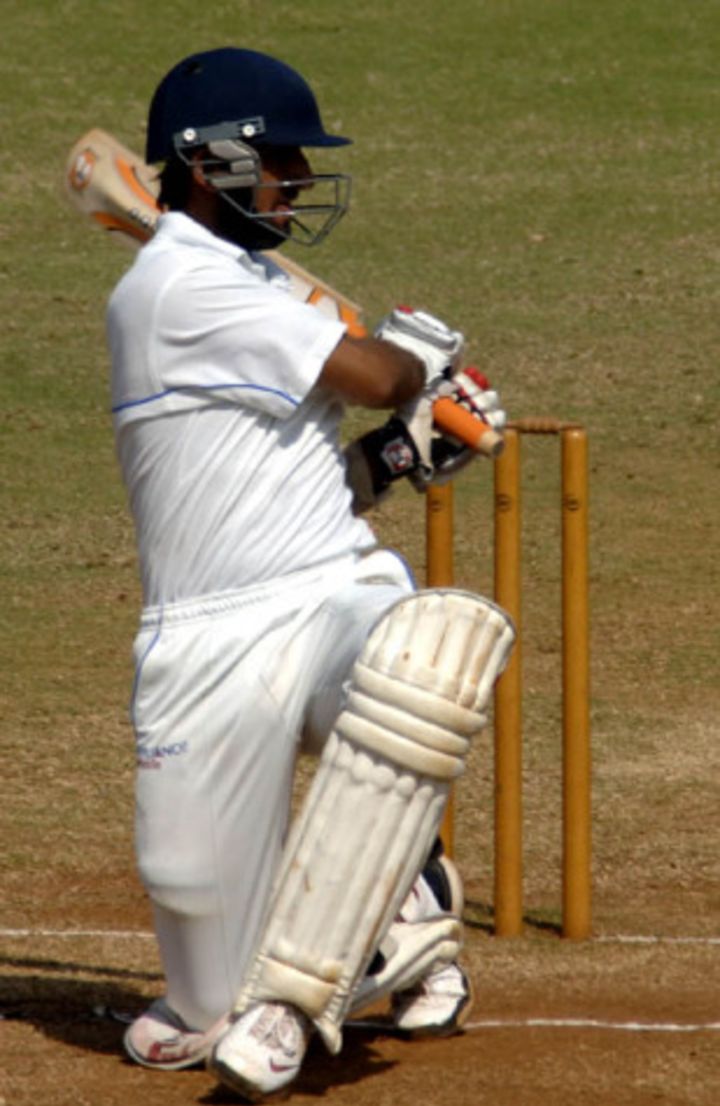Domestic run-machine gets Test ride
Cheteshwara Pujara has spent the last four seasons ticking almost every possible box that could be ticked from outside the Test squad

This was a call the selectors couldn't really have delayed much more. Cheteshwar Pujara was not knocking at that door. No sir, he had a log in his hand and he was threatening to break it down. He has spent the last four seasons ticking almost every possible box that could be ticked from outside the Test squad.
They said he scored only on the flat Rajkot pitch, he went outside and scored. They said he didn't score big hundreds, he replied with three consecutive triples. They said he was slow, he changed his game and became a quick scorer. He went to England and scored. He went to Australia and scored. Until Sunday, at the age of 22, Pujara had scored 14 first-class centuries, averaged 60.38, and was far away from India selection. Statistics of course are no guarantee of Test material, but if he hasn't deserved a chance to fail, not many have.
Twenty-two is not an age to feel desperate. Twenty-two is also not an age where perspective comes easy. Those who know Pujara well have seen both desperation and perspective in him. Aakash Chopra, former India opener, has been on the same bus at times - literally and metaphorically. The two have been part of many an Irani squad or an A team, even the Kolkata Knight Riders IPL squad. They have spent many an evening running up and down cricket grounds, many an evening discussing what has been a mysterious selection world to them.
Chopra is glad Pujara's time has come. He remembers how dejected Pujara felt when Kolkata dropped him during the first season of the IPL, and how his injury during the second IPL was the worst low.
"He wouldn't like the word 'dejected'," says Chopra. "But whenever you are not picked, you feel left out. There are enough people around to make you believe you deserve to be there. And also when you have scored so many runs, there needs to be a solid justification. But he has conducted himself really well. Even though he has been dejected he hasn't allowed it to surface.
"The only way he has responded is by scoring runs. You can end up sulking, you can change your game too much. He has a correct, solid technique, suited for the longer version. But there has to be a temptation to change your game when you see flashier, less prolific batsmen move up and not you. He hasn't really changed. He has maintained the base. His batting has revolved around that base beautifully."
It is actually ironic that a correct batsman's most desperate moment should come during a Twenty20 league. That just shows how much Indian cricket has changed since the advent of the IPL. If first-class runs don't seem to matter, what's a boy to do?
Arvind Pujara, his father, used to borrow bats for Cheteshwar when he was younger. Cheteshwar scored his first triple-century with one of those borrowed bats. Arvind, a former Ranji Trophy player himself, has been a big influence on the son's career ever since the mother died. "Ye pakad ke rakhna bahut mushkil hota hai [To keep holding on is very difficult]," says Arvind about the constant rejection by the selectors. "But his mother gave him a great quality. To pray everyday, that keeps him positive, helps him concentrate. Nowadays he just tells me, 'My job is to play cricket, rest will take care of itself.' Unfortunately that mother is not there to witness this."
Cheteshwar did play cricket five days after his mother died. The young boy, attached to his mother, didn't want to play that Under-19 event, but his relatives said his mother wouldn't have had it any other way. In the third match, he scored a century. Arvind thinks Cheteshwar is ready for bigger setbacks too. "He says it doesn't matter if he doesn't become a big batsman, he will be happy if he is a good human being."
There has to be a temptation to change your game when you see flashier, less prolific batsmen move up and not you. He hasn't really changed. He has maintained the base. His batting has revolved around that base beautifullyAakash Chopra
Still Chopra has felt his younger friend's pain. "I have spent enough hours with him. Occasionally, talking man to man, when you talk your heart out, it would come out. Questions like why not?"
Isn't it, then, the sign of the new impatient generation? He is just 22 after all. Chopra thinks otherwise. "Disappointment is always going to be there," Chopra says. "Whether you are 19, 20 or 29. It has also got to do with what is happening around you. In india - and it has a lot to do with the kind of selections and with the advent of the IPL, even younger people are hogging the limelight.
"Not only younger, lesser talented people, who have done far fewer things in the world of cricket, getting more limelight, more money, more recognition in the world of cricket. That is good enough reason to feel dejected. You are told if you score, you will be picked. If you are not, there is a serious problem."
The worst is over, though. Or is it? Pujara is unlikely to get a game against Australia, unless there are two injuries. It will be crucial to groom him, and not keep him as a one-off selection. They wouldn't want to take an uncapped batsman to South Africa. They wouldn't want to drop him without giving him a game either. Where Pujara goes from here is not just Pujara's test, but that of the captain, coach and selectors too.
Sidharth Monga is an assistant editor at Cricinfo
Read in App
Elevate your reading experience on ESPNcricinfo App.